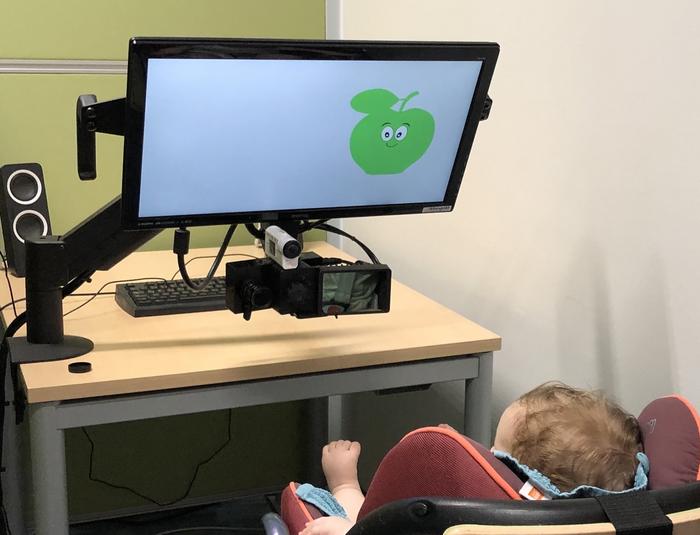Recent research has unveiled groundbreaking insights into the intricate world of infant perception, particularly regarding how infants as young as three months can recognize internal body signals such as their own heartbeat and breathing patterns. Conducted by a group of pioneering researchers at the Wiener Kinderstudien Lab, University of Vienna, the study sheds light on these previously uncharted realms of infant development and cognitive processes. The findings hold significant implications for understanding emotional and social development in infants, marking a key advancement in the field of developmental psychology.
At a mere three months, babies are actively engaging with the world, absorbing their surroundings and beginning to form perceptions of their own bodies. For years, it was largely assumed that a child’s awareness of bodily sensations increasingly developed over time. However, this recent study has flipped that notion, suggesting that even in their infancy, babies demonstrate a remarkable capacity for perceiving and responding to intrinsic cues like their heartbeat. This ability lays the groundwork for a more profound understanding of self-awareness, which is crucial for emotional regulation and healthy interpersonal relationships as they grow.
The innovative methodology employed by the researchers is particularly noteworthy. Rather than relying on verbal or behavioral reports—which is impractical with infants—the team adopted a more novel approach. By tracking the infants’ eye movements while they observed animated figures that either synchronized or desynchronized with their own physiological rhythms, the researchers could effectively measure awareness of their body signals. This method opened a window into the cognitive processes of very young infants, offering not only evidence of their perceptual capabilities but also insights into the nature of these processes.
As the study progressed, researchers discovered that while infants can perceive their heartbeat consistently from three months onwards, the perception of breathing underwent a remarkable enhancement during their second year of life. Interestingly, the study revealed that these two senses—heartbeat perception and breathing awareness—do not appear to influence each other, echoing a similar phenomenon observed in adults. This independence suggests a complex and multifaceted developmental pathway in how infants learn to interpret their body signals.
The implications of this research extend beyond mere academic curiosity. Understanding the nuances of how babies perceive their own bodily sensations could provide critical insights into their emotional development. For example, the ability to recognize their internal signals may significantly influence how infants interact with their caregivers. Babies depend on their caregivers’ responses to their physical cues for essential needs like hunger, comfort, and social connection. When caregivers respond appropriately to a baby’s needs, it fosters a secure attachment and contributes to the baby’s developing sense of self.
Developmental psychologists are increasingly aware that early experiences shape mental health trajectories. This study’s findings underscore the importance of fostering body awareness in infants which may well translate into healthier emotional development later in life. By prompting infants to recognize their heartbeat and breathing, caregivers might inadvertently be helping them strengthen their own emotional regulation skills, which are foundational for future social interactions.
Moreover, the research emphasizes the necessity of prioritizing maternal and paternal roles in shaping infants’ body perception. Parents can create nurturing environments where children learn to recognize and articulate their feelings, improving their social and emotional skill sets. Education programs targeting parents with strategies to encourage bodily awareness could cultivate an emotionally intelligent generation, capable of understanding and navigating personal emotions and social cues more effectively.
In the larger context of developmental research, this study illustrates the vast potential for exploring infant sensory awareness as a tool to enhance our understanding of emotional and social competencies. Future investigations will likely delve deeper into how these early body perceptions relate to socio-emotional learning, potentially uncovering critical periods in which nurturing practices have the most substantial impact on self-awareness and emotional health.
With this knowledge, researchers are poised to explore pathways to not only improve emotional development within the early years but also to develop interventions aimed at mitigating risks of emotional dysregulation in later childhood and adolescence. Harnessing this understanding could contribute to mental health strategies that begin in the earliest stages of life, fostering resilience and emotional intelligence.
As the study has been published in the reputable journal, eLife, it reflects the growing recognition of interdisciplinary research that bridges psychology, neuroscience, and child development. The cooperative efforts of researchers from diverse academic backgrounds further enhance the integrity and applicability of these findings, affirming the significance of cross-institutional collaboration in advancing scientific knowledge.
In summary, the research highlights a crucial linkage between internal body awareness and the development of emotional regulation from an early age. As society increasingly emphasizes mental health and emotional well-being, the revelations from this study are not merely academic—they represent a call to action for parents, educators, and practitioners to cultivate environments conducive to nurturing young lives. The thought-provoking nature of this research is bound to permeate the discourse surrounding developmental psychology, urging new strategies for promoting healthy emotional and psychological development from infancy onward.
By recognizing and facilitating the development of body awareness in infants, we can contribute to their emotional resilience and well-being, laying a strong foundation for future generations.
Subject of Research: Perception of internal body signals in infants
Article Title: Respiratory and Cardiac Interoceptive Sensitivity in the First Two Years of Life
News Publication Date: 31-Mar-2025
Web References: http://dx.doi.org/10.7554/eLife.91579
References: [Not provided in the content]
Image Credits: Wiener Kinderstudien
Keywords: Infant perception, body awareness, emotional development, heartbeat, breathing, developmental psychology, interoception




